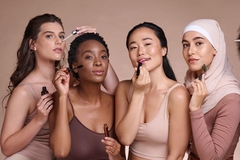Commonly used probiotics could treat demoralizing effects of Acne Vulgaris in adolescents, researchers reveal

19 May 2023 --- Acne vulgaris is a common skin condition characterized by the presence of pimples that affect about 85% of Western adolescents. The condition has been shown to cause unsightly and even painful blackheads, whiteheads and cysts, and can have lasting effects on adolescents’ self-esteem and self-image and increase anxiety.
Moreover, experts state that more conventional treatments can sometimes be as uncomfortable as the symptoms.
However, the potential for topical probiotics – which are considered safe and to have fewer adverse effects compared to standard therapies – is promising, according to a new Portugal-based review study.
“Probiotics have proven to be an alternative to the use of antibiotics, often associated with undesirable effects, in the treatment and prevention of dermatological disorders such as acne,” state the study’s authors.

“This review provides a comprehensive analysis of the pathophysiology, risk factors, symptoms, conventional treatment recommendations and main studies emphasizing innovative topical products for acne-prone skin based on probiotics.” Some of the common treatments for Acne Vulgaris can increase photosensitivity.
Some of the common treatments for Acne Vulgaris can increase photosensitivity.
Common treatments
According to the study, published in Cosmetics, some of the most commonly used ingredients to treat acne include alpha- and beta-hydroxy acids (AHAs and BHAs), such as glycolic acid and lactic acid, salicylic acid, retinoids, nicotinamide, sulfur and zinc salts.
However, the researchers also note that alpha-hydroxy acids such as retinoids can be photosensitizing and make the skin more vulnerable to UV damage and that ingredients like sulfur, which is often paired with salicylic acid, can have positive effects but is often avoided due to the “rotten egg” smell associated with the ingredient, which can further affect a person’s self-image.
Plant-derived ingredients have also gained popularity, but the study notes that the evidence supporting their use is limited, often based on in vitro studies lacking clinical trials on human skin.
The study also emphasizes the importance of sunscreen in managing acne-prone skin and preventing post-inflammatory hyperpigmentation. Emollient, antioxidant, non-comedogenic, water-based, and broad-spectrum sunscreens (SPF ≥ 30) are recommended.
The researchers note that certain ingredients derived from Cannabis have also shown favorable effects on sebocytes but point out that not all phytocannabinoids have been shown to have any proven beneficial efficacy for acne-prone skin.
Biotic alternatives
The researchers highlight that common probiotic strains such as Lactobacillus and Bifidobacterium – two trusted and well-researched strains – show the greatest potential for treatment efficacy by inhibiting the growth of acne-causing bacteria, reducing inflammation and improving the skin barrier function.
Additionally, the study notes that common probiotics, and even pre- and synbiotics, have been shown to affect the skin microbiome along the gut-skin axis and within topical formats by inhibiting the growth of Cutibacterium acnes (C. acnes), the bacterium responsible for most acne growth. Studies suggest that Acne Vulgaris can have lasting mental effects on adolescents.
Studies suggest that Acne Vulgaris can have lasting mental effects on adolescents.
“Probiotics and prebiotics in association (synbiotics) have the capacity to maintain and restore the skin microbiota,” reads the study. “In cosmetic formulations, prebiotics can selectively increase the activity and growth of beneficial skin probiotics.”
One study in the review carried out an in vitro study to investigate the symbiotic ability of probiotic bacteria in association with the prebiotic konjac glucomannan hydrolysates to inhibit C. acnes growth. It found that different probiotic bacteria strains were able to inhibit the growth of C. acnes and “significantly improved the health of the skin of young women with acne.”
Other alternatives
In related news, a team of French and Italian researchers found that the short-chain fructo-oligosaccharides (scFOS) prebiotic derived from the sugar beet can balance the skin microbiota by inhibiting the growth of potential pathogens and promoting the growth of beneficial bacteria.
Additionally, a separate research team in Italy found that combining some probiotic strains with botanical extracts from Solanum melongena L. and Echinacea as a dietary supplement reduced the total amount of acne-related facial lesions bolstered the treatment and control of inflammatory acne after eight weeks of use in 114 participants aged 23 to 30.
Edited by William Bradford Nichols













